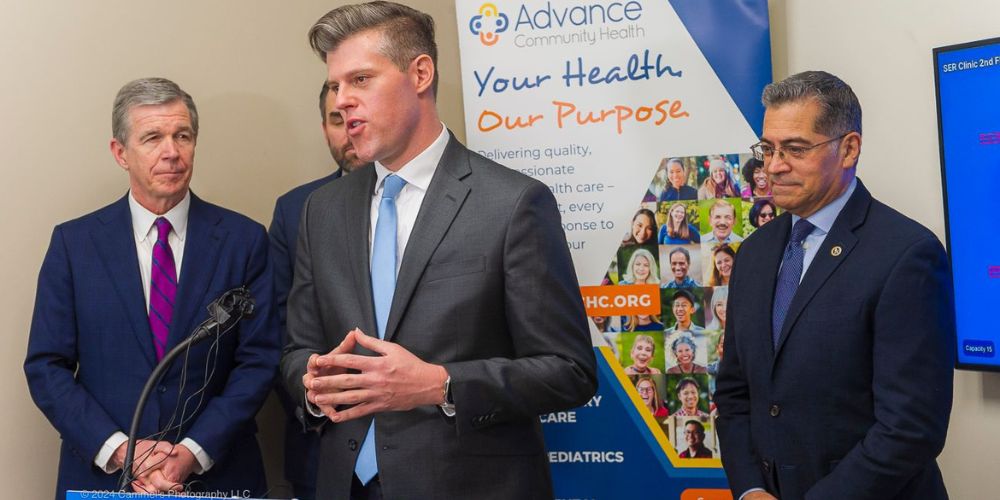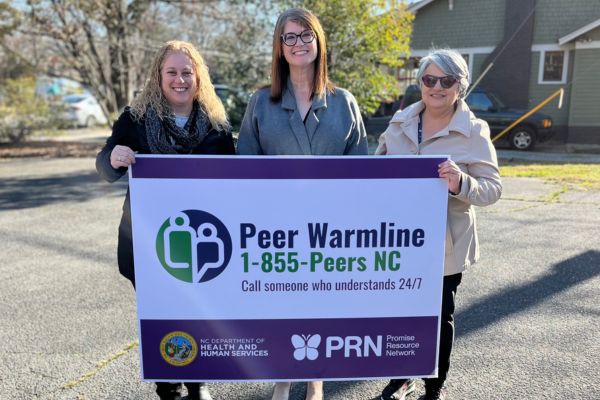|
|
|
|
 |
This week, NCDHHS launched a Community Partner Engagement Plan and website to ensure the voices of North Carolina communities and families are at the center of the department’s work.
Go to ncdhhs.gov/GetInvolved to see the many groups, organizations and commissions that NCDHHS currently partners with. The department will continue to update the website and encourages community members to get involved with a current group or sign on to work with the divisions that focus on your area of interest.
To improve internal processes, Secretary Kinsley issued a Secretarial Directive that unifies the department’s collaborative efforts into a guide for how to best engage with communities.
NCDHHS is excited to deepen its partnerships and collaboration by strengthening connections with communities statewide and listening to their insights. The department’s goal is to grow together with North Carolinians and make major progress toward better health for all.
Learn more in the Community Partner Engagement Guide and watch a video from Secretary Kinsley where he announces the plan. For more information on how to partner with NCDHHS, email HealthEquityOffice@dhhs.nc.gov. |
|
 |
|
Photo Credit: Cammel Hurse - Cammel's Photography LLC
Pictured left to right: Gov. Cooper, NCDHHS Secretary Kinsley and U.S. HHS Secretary Becerra
Last week, the U.S. Health and Human Services Secretary Xavier Becerra joined Gov. Cooper and NCDHHS Secretary Kody H. Kinsley for a Medicaid expansion roundtable with beneficiaries and providers at Advance Community Health in Raleigh.
Together they discussed the monumental impact Medicaid expansion is having on the more than 350,000 individuals who are now enrolled in the program since it launched more than two months ago. Medicaid has covered more than 265,000 prescriptions for new enrollees for heart health, diabetes, seizures and other illnesses, and covered more than $4.8 million in claims for dental services since Dec. 1, 2023.
The Medicaid Expansion Dashboard shows the immediate impact Medicaid expansion is having on people in North Carolina. NCDHHS’ Medicaid Expansion website also includes information on eligibility, FAQs, how to apply and a sign-up form to receive the latest news and updates. To learn more or apply for NC Medicaid, visit Medicaid.nc.gov. |
|
|
|
 |
|
NC Leads the Way in Expanding Access to Treatment for Syphilis
NCDHHS is raising awareness among providers and patients of a recent rate increase that supports treatment for Medicaid beneficiaries to help combat rising cases of syphilis, including congenital syphilis. As of Feb. 1, the Medicaid reimbursement rate has been increased to reflect the updated costs of the medication Bicillin L-A, which can be used to treat syphilis and is the only known effective treatment for preventing congenital syphilis. NC proposed the change to the Centers for Medicaid and Medicare Services to increase payment to providers so they can treat people with syphilis or congenital syphilis in their offices instead of referring patients to other places for treatment. Between 2012 and 2023 (preliminary data), there was a nine-fold increase in reported syphilis cases among women with an associated 72-fold increase in congenital syphilis infections. In NC, more than half of births are to Medicaid-eligible women, making Medicaid a pivotal player in addressing this issue with patients and providers. Organizations can request free educational materials about the rise of syphilis through March 1. Learn more about syphilis and where to get tested on the NCDHHS website.
|
|
 |
What You Need to Know About Substance Use
NCDHHS is partnering with the NC Department of Justice in its webinar series, Protecting the Next Generation of North Carolinians, for a discussion about youth substance use on Feb. 28 at noon. Today's youth face a variety of challenges – some that may be familiar to parents and many that simply did not exist in generations past, before fentanyl, cell phones and social media. To help support parents, caregivers and people who work with children and youth, NCDOJ launched a webinar series: Protecting the Next Generation of North Carolinians. According to the National Center for Drug Abuse Statistics, in the last month 65,000 North Carolinians aged 12 to 17 (8.14%) reported using drugs, and 9.17% reported using alcohol. Since their introduction in 2011, rates of youth e-cigarette use in North Carolina have steadily increased, impacting 20.9% of high school students and 6.1% of middle school students in 2019. This webinar is designed to provide parents, caregivers, grandparents and others who work with youth with helpful information and practical tips to help us all keep NC kids healthy and safe. Register for the webinar. |
|
|
|
 |
Additional Phone Support for People Experiencing Mental Illness or Substance Use
NCDHHS launched a new Statewide Peer Warmline on Feb. 20 to give callers the option to speak with a Peer Support Specialist, people living in recovery with mental illness and/or substance use disorder who provide support to others who can benefit from their lived experience. People in need of assistance and wanting to speak with a peer can call the warmline at 1-855-PEERS NC (1-855-733-7762), and people who call 988 will have the option to connect with the Peer Warmline if they prefer to speak with a peer. The statewide Peer Warmline is a phone line staffed by peer support specialists who offer non-clinical support and resources to those in crisis. Their unique expertise helps reduce stigma while strengthening overall engagement in care. Like 988, North Carolina’s peer warmline is available 24 hours a day, 7 days a week. According to the NCDHHS 988 Performance Dashboard, more than 40% of 988 callers are repeat callers who find it helpful to speak with someone. By providing access to peers, the warmline expands and enhances 988’s ability to offer that service. The Peer Warmline is part of NCDHHS’ broader strategy to improve behavioral health in North Carolina.
|
|
 |
Side-by-Side Webinar with NCDHHS' Mental Health Division
Join staff from NCDHHS' Division of Mental Health, Developmental Disabilities and Substance Use Services on March 5 at 2 p.m. to learn more about policies and programs that affect the Mental Health, Intellectual and Developmental Disabilities, Substance Use Services and Traumatic Brain Injury community. The goal of these monthly webinars is to bring everyone together in one (virtual) place to share ideas for public policy that will improve the lives of North Carolinians. This group includes consumers, families, advisory groups, LME/MCOs, community members and partner organizations. This month’s topic is child behavioral health investments. Register for the meeting and see a flyer for more information. |
|
|
|
|
|
|
|
|

